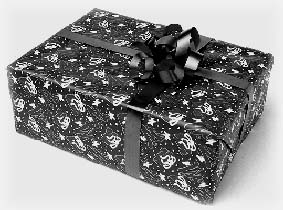|
Exercises
How
Do You Do?
How
do you do? If you can speak English,
you know a lot of English words. You can read, speak and understand.
But there is another kind of language you need to know, the
language of the body. All over the world, people "talk" with their
hands, with their heads, and with their eyes. When Japanese
people meet, they bow. When Indians meet, they put their hands
together. What do American and British people do?
Americans are more informal than the British.
They like to be friendly. They use first names, they ask questions,
and they talk easily about themselves. When they sit down,
they like to relax in their chairs, and make themselves comfortable.
British people are more reserved. They take
more time to make friends. They like to know you before they
ask you home.
When British and American people meet someone
for the first time, they shake hands. They do not usually
shake hands with people they know well. Women sometimes kiss
their women friends, and men kiss women friends (on one cheek
only). When a man meets a male friend, he just smiles, and
says "Hello". Men do not kiss each other.
Clothes These days, most people in
Britain and the USA do not wear very formal clothes. But sometimes
it is important to wear the right thing.
Many British people don't think about clothes
very much. They just like to be comfortable. When they go
out to enjoy themselves, they can wear almost anything. At
thetres, cinemas and
 concerts
you can put on what you like-from elegant suits and dresses
to jeans and sweaters. Anything goes, as long as you look
clean and tidy. concerts
you can put on what you like-from elegant suits and dresses
to jeans and sweaters. Anything goes, as long as you look
clean and tidy.
But in Britain, as well as the USA, men in
offices usually wear suits and ties, and women wear dresses
or skirts (not trousers). Doctors, lawyers and businessmen
wear quite formal clothes. And in some hotels and restaurants
men have to wear ties and women wear smart dresses. Jeans
and open shirts are sometimes not allowed.
In
many ways, Americans are more relaxed than British people,
but they are more careful with their clothes. At
home, or on holiday, most Americans wear informal or sporty
clothes. But
when they go out in the evening, they like to look elegant.
In
good hotels and restaurants, men have to wear jackets and
ties, and women wear pretty clothes and smart hairstyles.
It is difficult to say exactly what people
wear in Britain and the States, because everyone is different.
If you are not sure what to wear, watch what other people
do, and then do the same. Or ask the advice of a friend or
your host. You'll feel more relaxed if you don't look too
different from everyone else.
Sorry! I'm late! In Britain and the USA most people
are careful about time.
If they want to see a friend, or meet a business
colleague, they telephone first to make an appointment. A
lot of people don't like surprises. They want to know when
a visitor is going to arrive.
Have you arranged to meet someone at 3 o'clock?
It's polite to arrive a few minutes early. Of course, everyone
is late occasionally. Cars break down, trains are delayed
and meetings go on too long. If you're late, just say sorry,
and explain what happened. Sometimes it's impossible to keep
an appointment. But if you don't arrive, the other person
will be upset. Call them to explain.
Some people usually spend time chatting and
drinking tea or coffee before they start a business meeting—but not in Britain or the USA. There, they like to talk
about business first and chat later—if there's time.
Office hours in Britain and the USA are from
9 a.m. until 5 p.m., but some offices open at 8.30 or 9.30
a.m. and do not close until 5.30 or 6 p.m. People usually
take about one hour for lunch (between 12 and 2 p.m.). Shops
open at 9 or 9.30 a.m., and stay open until 5.30 or 6 p.m.
Most shops are open all day on Saturday, and are closed all
day on Sunday.
Out and about in town Did you invite
your friend to the restaurant? Then you pay the bill. Did
your friend invite you? Your friend pays. If there are men
and women in the party, the men usually pay.
These days, men and women are equal in many
ways. If you work in Britain or America, your boss could be
a man or a woman. There are women in important positions in
politics, law, medicine and in the business world. But it
is still polite for a man to open doors for women, and to
ask them to go first. And it is polite for men to stand up
when they are introduced to women. On informal occasions,
of course, everyone is more relaxed.
Names American and British people have
two names: a "first" name, and a "surname" or "family" name.
Here are some examples.
| First name |
Surname |
| Marilyn |
Monroe |
| Margaret |
Thatcher |
| Elvis |
Presley |
Family members and friends always use first
names, but Americans are more informal than British people,
and they use first names with nearly everybody. But it's usually
a good idea to use surnames until people ask you to use their
first names.
When people want to be formal, or when they
do not know each other very well, they use surnames with "Mr",
"Mrs" for married women, and "Miss" for unmarried women. Some
women don't like to say if they are married or not. When they
write their name, they use "Ms", not "Mrs" or "Miss". People
never use "Mr", "Mrs", "Miss" or "Ms" with first names alone.
Some people have middle names: Winston Spencer
Churchill.
British people do not use their middle names,
but Americans often give the initial: John F. Kennedy, Richard
M. Nixon.
When a woman marries, she usually does not
use her old surname any more, but takes her husband's surname.
The children have their father's surname too. So, if John
Smith marries Susan Brown, she becomes Susan Smith and their
children are Elizabeth Smith and Tom Smith.
Some American men have the same first name
as their father. The son puts Jr. (Junior) after his name,
and the father puts Sr. (Senior) after his name: Martin Luther
King Sr.
"Sir" is a British title for men who have
done a lot for their country. "Sir" is used with the first
name, not with the surname alone: Sir Winston, or Sir Winston
Churchill (not Sir Churchill).
Many English names have short forms. They
sound more friendly and informal than the whole name. But
some people don't like the short form of their name. Listen
to what other friends say before you use a short form. Here
are some examples:
WOMEN'S NAMES
| REAL NAME |
SHORT NAME |
| Diana |
Di |
| Elizabeth |
Liz |
| Margaret |
Maggie |
| Jacqueline |
Jackie |
| Katherine |
Kathy (or Kate) |
| Jane |
Janie |
| Susan |
Sue |
Have you heard of Princess Di, Liz Taylor
or Maggie Thatcher?
MEN'S NAMES
| REAL NAME |
SHORT NAME |
| James |
Jim (or Jimmy) |
| Charles |
Charlie |
| Robert |
Bob (or Bobby) |
| Edward |
Ed (or Teddy) |
| Richard |
Dick |
| Thomas |
Tom |
| Michael |
Mike (or Micky) |
| Andrew |
Andy |
Have you heard of Jimmy Carter, Charlie Chaplin
or Teddy Kennedy?
Come to a party! Most parties are quite
relaxed these days, especially young people's parties. You don't
have to wear a long dress or a black tie when you want to have
a good time. In fact, you can usually wear what you like—anything
from jeans to suits and dresses. British and American people
are often very informal.
Informal invitations all look very different. People will
expect an answer even to an informal invitation. Just call
to say if you can or cannot come. What do you do if someone asks you to "tea"? For some British people, "tea" means a cup of tea and a biscuit
at 4.30 or 5 p.m. For others, "tea" or " hightea", to be exact,
means a meal at 6.30 or 7 p.m. "Formal dress" usually means a suit and a tie for men, and
a smart dress for women. "Black tie" means that the men wear
dinner jackets and the women wear evening dresses. "Black
tie" is only for very special occasions. Come to dinner! Some British and American people like
to invite friends and colleagues for a meal at home. But don't
be upset if your English friends don't invite you home. It
doesn't mean they don't like you! Dinner parties usually start between 7 and 8 p.m. and end
at about 11. Ask your host what time you should arrive. It's
polite to bring flowers, chocolates or a bottle of wine to
your hostess. Usually the evening starts with drinks and snacks. (Ask
for a soft drink if you don't like alcohol.) Do
you want to be extra polite? Say how much you like the room,
 or
the pictures, or your hostess's dress. But remember—it's
not polite to ask how much things cost. Dinner will usually
start at about 8 or 9 o'clock. In many families, the husband
sits at one end of the table and the wife sits at the other
end. They eat with their guests. You'll probably start the
meal with soup, or something small as a "starter", then you'll
have meat or fish with vegetables, and then a dessert (some
times called a "sweet" or a "pudding"), followed by coffee.
It's polite to finish everything on your plate and to take
more if you want it. Some people eat bread with their meal,
but not everyone does. or
the pictures, or your hostess's dress. But remember—it's
not polite to ask how much things cost. Dinner will usually
start at about 8 or 9 o'clock. In many families, the husband
sits at one end of the table and the wife sits at the other
end. They eat with their guests. You'll probably start the
meal with soup, or something small as a "starter", then you'll
have meat or fish with vegetables, and then a dessert (some
times called a "sweet" or a "pudding"), followed by coffee.
It's polite to finish everything on your plate and to take
more if you want it. Some people eat bread with their meal,
but not everyone does. Did you enjoy the evening? Call your hostess the next day,
or write her a short "thank you" letter. Perhaps it seems funny to you, but British and American people
say "thank you, thank you, thank you" all the time!
(1,640 words)
Text
|
